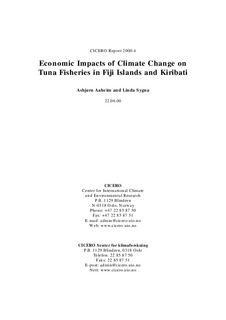| dc.description.abstract | This paper discusses the possible economic consequences of a change in the tuna fisheries in the Pacific Ocean resulting from climate change. On the background of Lehodey's (2000) study of potential changes in the tuna fisheries, we survey possible economic impacts in terms of quantities and values and give examples of macroeconomic impacts. The two main effects of climate change on tuna fishing are likely to be a decline in the total stock and a migration of the stock westwards. This will lead to various changes in the catch in different countries. The price of the fish in the export market may also change as a result. The Pacific islands are generally dependent on fisheries, and may therefore be vulnerable to these changes, although some will probably gain while others will lose. Based on a very simple macroeconomic model, it is shown that the resulting effects for the national economy in general may diverge substantially from the expected. This applies, in particular, if the national economies are inflexible and a large part of the population relies on subsistence production, which is the case for many developing countries. | nb_NO |
